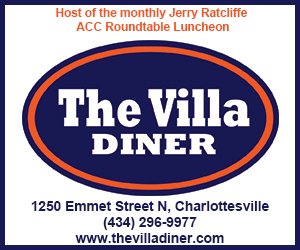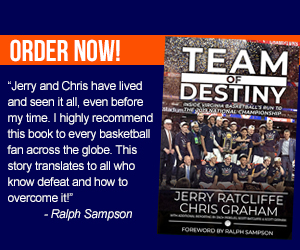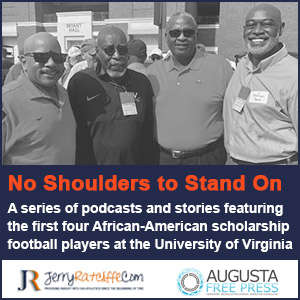Curtis Strange Dishes on Life, Golf, ‘Hoos
By Jerry Ratcliffe
 Curtis Strange loves to tell the story about his brother, Allan, and uncle, Jordan Ball, traveling to The Country Club in Brookline, Mass., as he won his first of back-to-back U.S. Open championships in 1988.
Curtis Strange loves to tell the story about his brother, Allan, and uncle, Jordan Ball, traveling to The Country Club in Brookline, Mass., as he won his first of back-to-back U.S. Open championships in 1988.
Allan, who is Curtis’ identical twin, had a tradition of avoiding attending big events because he didn’t want to distract from his brother’s focus. However, because Ball pressured Allan, he agreed to fly up to Boston on Monday morning of the playoff to see Curtis in an 18-hole playoff with Nick Faldo for the title.
“So, they talked [Allan] into going and they fly up, rent this go-to-hell rent a wreck, and drive to The Country Club,” Curtis Strange began to explain. “They’re a couple miles from the club and they don’t have a ticket, no credentials whatsoever.”
They also had no parking pass, but the four men in the rent a wreck realize that they have Allan.
“So Allan is in a golf shirt and shorts, and because we’re identical, they put him behind the driver’s wheel and he pulls up to the front gate, and the guards say, ‘Hey Curtis, how you doing? Go kick some ass.’ Allan says thank you sir, have a good day.
“So they’re in.”
The four men get to the USGA office on premises, secure tickets, around 11:30 a.m. Curtis was to tee off around 2 p.m.
“They got there early and my uncle and brother say, gosh it’s been a hard day already. Let’s have a beer,” Curtis said. “They’re out at the putting green with about 500 people or so there. Allan, my identical is drinking a Budweiser. Can you imagine what people are thinking?
“Now they’re drinking three or four beers and I show up at the putting green. By now there’s a couple of thousand people milling around, and I’m guessing they could only be saying, ‘Look at Curtis, he’s preparing like I do. He’s drinking a beer.’ Allan is standing there with three or four cups on top of each other.”
Lord only knows what unsuspecting or unknowing fans must have thought as Curtis went on to tee off, then beat Faldo for the U.S. Open championship that day.
Strange said the better part of the story has seldom been told. Jerry Pate, who knew Allan well, was the course reporter for ABC, and pulled Allan inside the ropes to walk with him the last nine holes that day.
“We were leaving the 18th green, and I’ll never forget, Pate asked Allan if he wanted to stay. I never saw or heard him because it was so loud out there. Allan told Pate, ‘No, I don’t want to stay. [Curtis] doesn’t need me now. If he had lost, we would have stayed.’ I thought that was pretty cool and smart.”
Strange’s phone rang in his hotel room about 1:30 that night and it was Allan. They talked for about an hour.
“I was glad that he could be there, and my uncle as well,” Curtis Strange said. “That was the biggest day of my life. Allan and I had talked every Sunday night or Monday morning damned near ever week that I played. He was a big part of it all.”
From Player to Media Member
It’s always fun catching up with Strange, who is now a TV course reporter and golf analyst, and is still involved in the U.S. Open along with many other golf tournaments.
I couldn’t help but ask him about what his transition was like from player to TV reporter, and got, what I thought, was an incredibly candid and great answer.
Strange said that interviewing players, sometimes after disappointing losses, is not as easy as it looks. The interviewing process in general is a matter of repetition.
“I never did that in any of my [TV] jobs until I went to Fox,” Strange said. “I laugh all the time, doing the U.S. Amateur, the quarters, the semifinals, and finals, I get to interview the loser. Well that’s [bleep] practice for somebody that’s never done it before.
“I’ve had kids say the F-bomb on TV, I’ve had kids crying in my face on TV, live on the air.”
After a couple of those experiences early on in his interview career with Fox, Strange wasn’t sure how to handle it all, and so sought out advice from someone he considers to be the absolute best, ESPN’s Tom Rinaldi.
“I wanted to know his opinion of how I handled this one or that one, or how do I handle that situation,” Strange said. “Guys like Tom are so smart because this is what they’ve been trained to do professionally, and they have such simple answers.
“I’ll never forget I called [Rinaldi] after I had this kid who lost in the semifinals two or three years ago. He should have won.
“My first question was, ‘You had a great week. I know you didn’t finish the way you wanted to, but congratulations.’ The kid started crying. I didn’t know what to do. I followed it up by saying, ‘Well, you’re going back to Michigan next week, you’ll be around your friends and it’s going to be fun.’ Well, he started crying harder.”
Strange wasn’t sure what he was supposed to do at that point, hand the kid a hanky, give him a shoulder to cry on, or what. After the tournament, he called Rinaldi and asked how he would have handled the situation.
“Tom said, it’s very simple. You look at him and say, ‘You’re emotional now. Why?’
“Just simplify it. I’ve really enjoyed trying to do that,” Strange said.
The Phil Mickelson interview last year, when Mickelson ran down a moving putt and struck it during the 2018 U.S. Open. It was an automatic two-stroke penalty and some golf fans believed the popular Mickelson should have been disqualified.
You guessed it, our guy Strange, was sent to interview Mickelson about the incident.
“That was really difficult, but he pissed me off. That whole thing pissed me off. I wasn’t scared to ask him, ‘What are you thinking about?’” Strange said.
He quickly realized as most journalists learn, the way one must form a question for public consumption isn’t the way one would really prefer to frame the question
“You want to call the guy an idiot … what were you doing? It’s hard, but in stretches it’s good and you learn.”
The Back-to-Backs
Strange won the 1988 and 1989 U.S. Open and became the first golfer to do so since Ben Hogan in 1951. Since World War II, only Hogan, Strange, and Brooks Koepka, have accomplished the feat, putting them in an elite class of golfers.
I was curious. Which one of those changed his life the most?
“The first one, but it didn’t really change my life as much as some might think because I was already playing well on tour and accomplished a few things,” Strange said. “On my resume, this was kind of like my next step because everybody wrote about it and everybody told me I had to win a major.
“I asked myself, am I a failure if I never win a major? I think not, but you know how writers are,” Strange chuckled.
Yes, I do, and I chuckled, too.
“Everything got bigger and busier (after the first one), but as far as changing my life, I didn’t change my life. I tried to live back there in Williamsburg as quietly as I could. You try to bring up the kids as normal as possible and I think we did a pretty good job of that. Just do your thing, keep working.
“You almost have two different lives. You live the one at home, then live your life on the road, and they are different.”
Wahoowah!
Yes, Strange is a Wake Forest alum, but he grew up as a University of Virginia sports fan and still roots for the Cavaliers as well as the Deacons. When UVA won the national championship in basketball last April, Strange was giddy about the whole thing.
“Coach [Tony] Bennett and the kids, they looked like they had a lot of guts and played so hard,” Strange said. “They have such good kids. We forget that this is the biggest thing that many of these kids will ever participate in during their lives … those that don’t turn pro and those who don’t make it as a pro. This is something they’ll never forget.
“Heck, even some of those who go on to play in the NBA will never forget.”
Strange said some of the best memories he has came from college golf because “it was still fun back then … it wasn’t a job yet.”
To enjoy Virginia’s championship was special to Strange.
“I couldn’t have been happier for them. To win it the way they did adds to the storyline. It was good stuff.”








